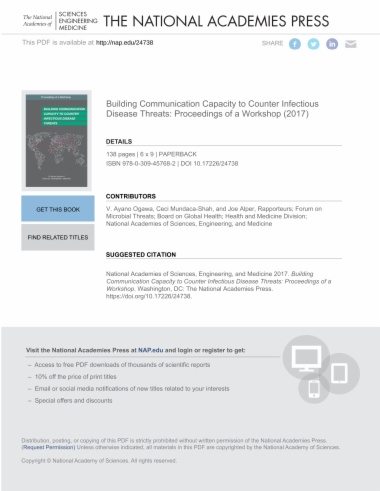

Building communication capacity is a critical piece of preparing for, detecting, and responding to infectious disease threats. The International Health Regulations (IHR) establish risk communication—the real-time exchange of information, advice, and opinions between experts or officials and people who face a threat to their survival, health, and economic or social well-being—as a core capacity that World Health Organization member states must fulfill to strengthen the fight against these threats. Despite global recognition of the importance of complying with IHR, 67 percent of signatory countries report themselves as not compliant. By investing in communication capacity, public health and government officials and civil society organizations facing health crises would be prepared to provide advice, information, and reassurance to the public as well as to rapidly develop messages and community engagement activities that are coordinated and take into account social and behavioral dynamics among all sectors.
To learn about current national and international efforts to develop the capacity to communicate effectively during times of infectious disease outbreaks, and to explore gaps in the research agenda that may help address communication needs to advance the field, the Forum on Microbial Threats of the National Academies of Sciences, Engineering, and Medicine convened a 1.5 day workshop on December 13 and 14, 2016, in Washington, DC. Participants reviewed progress and needs in strengthening communication capacity for dealing with infectious disease threats for both outbreaks and routine challenges in the United States and abroad. This publication summarizes the presentations and discussions from the workshop.